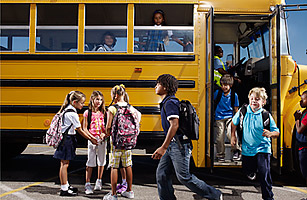
Kids like these in Los Angeles are starting the school year with high hopes — and so are reformers
(3 of 4)
At first, the thought of making a movie about this quagmire filled Guggenheim with dread. But a month later — while driving his kids past three public schools to get to their private school in Los Angeles — he felt the one sensation that is, at least to a documentary filmmaker, more powerful than dread. He felt guilt.
He called Participant Media back to say he'd reconsidered. Along with Lesley Chilcott, a producer he had collaborated with on An Inconvenient Truth, he immersed himself in education research and quickly became overwhelmed — by the infighting, confusion and emotion. "This is the hardest movie we've made, by a factor of 10," he says. But there was one thing education reformers had that environmentalists did not: an alternate universe where things worked the way they should. Chilcott and Guggenheim visited the KIPP LA Prep school in Los Angeles, where eighth graders are outperforming their peers across the city and the state in all subjects, despite the fact that 95% of them are poor. Then Guggenheim heard about charter-school lotteries, in which leaders of oversubscribed schools pull bouncing balls out of metal cages to determine which kids will get a coveted space. "In the land where I have 14 choices of peanut butter," Chilcott says, "kids are entering a lottery to get into a decent school."
Enough Power to Save Us
Charter Schools operate outside the constraints of regular public schools. They get public money, but in most cases, their teachers are not unionized. This freedom has allowed a minority of them to shine, building flexible, demanding programs that defy expectations. But only 1 in 6 charter schools significantly outperforms traditional counterparts. And more than a third underperform. In any case, charters now represent only 4% of schools, so they are not an option for the vast majority of kids.
Guggenheim insists he did not intend to make a pro-charter movie: "I know people will say this movie is anti-this or pro-that. But it really is all about families trying to find great schools." The film's title came from Canada, the CEO of the Harlem Children's Zone, a 97-block area in New York City that includes two respected charter schools. As a kid in the Bronx, Canada recalls the crushing day he learned Superman does not exist. "Even in the depths of the ghetto, you just thought, He's coming." His mother thought he was crying the way a child cries when he discovers Santa Claus is not real. But no. "I was crying because no one was coming with enough power to save us."
When Guggenheim first approached Canada to be in the film, he blew him off. "I said, 'Nice to meet you. I know you're a tremendous filmmaker, but I don't think you're going to get Americans to care about this.'" Still, he invited Guggenheim to visit his charter schools. At these schools, the principals can hire their own staff. Teachers work longer days (and years) and often give out their cell-phone numbers should parents or students need to reach them after hours. If teachers consistently fail to help their students learn in ways that can be measured, they are asked to find another job.
At almost every other school in the country, such flexibility and professionalism are inconceivable because of teachers' union-negotiated contracts, long-standing education-culture norms or, in some cases, state law. Sometimes on purpose and sometimes by accident, teachers' unions have a long history of working against the interests of children in the name of job security for adults. And Democrats in particular have a history of facilitating this obstructionism in exchange for campaign donations and votes. Meanwhile, most schoolteachers work in isolation: they can get tenure after an average of just three years on the job, which means they likely have a job for life, but they very rarely get meaningful evaluations or effective training to improve, either. Guggenheim, a Democrat and a member of the directors' union, agonized over his portrayal of the teachers' unions in the film. But eventually, he decided he would have to acknowledge these truths. "We have to change," he says. "The unions can't protect bad teachers. They have to start helping good teachers."
One of the darkest scenes in Superman is when schools chancellor Michelle Rhee is proposing a revolutionary new contract for teachers in Washington, D.C. They could choose to make up to $140,000 pegged to their effectiveness — in exchange for giving up tenure for one year. Or they could keep tenure and accept a smaller raise. For two and a half years the union argued with Rhee over the details. The film portrays the conflict as a tense and personal standoff between Rhee and Randi Weingarten, the president of the American Federation of Teachers (AFT), and it makes, as a Variety review put it, "something of a foaming satanic beast out of Weingarten."
After a Superman screening this summer outside Washington, Rhee and Weingarten appeared on stage with Guggenheim. The tableau reflected this strange moment in the history of school battles. There was Guggenheim, in his horn-rimmed glasses and skinny black suit, sitting next to Weingarten, wearing sensible shoes and a blazer, next to Rhee, who was in a black, low-cut dress and strappy high-heeled sandals. About the only thing the women could agree on was that the film had made them both cry. "People ask me, Why do you do this?" Rhee said of her relentless campaign to transform D.C. schools without much regard for her sinking popularity among voters, who may oust her and the city's mayor this month. "This film answers that question. I can think of nothing more important that a group of people can be doing than to make sure this crazy injustice does not continue."